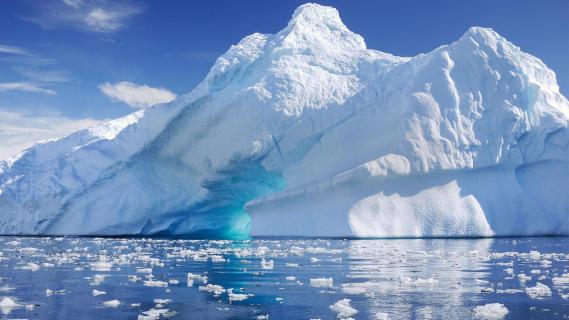
by Tessa Cheek
[caption id="attachment_6905" align="alignright" width="266"] Cynthia Wong[/caption]
Cynthia Wong[/caption]
We meet this year’s Alice Maxine Bowie fellow in creative nonfiction, memoirist Cynthia Wong, face down in a ship headed to Antarctica.
The year is 2001. Wong is mourning her husband. A dozen months ago, while cancer took its toll on his body, Wong sought comfort in their shared fascination with adventures to the far ends of the earth. Now, in a stranger-than-fiction scenario, Wong has discovered that a friend entered her in a radio contest for the trip and she’s won. It’s all happening. She’s going to Antarctica and she is radically alone.
“When I went I was mainly worried about leaving behind our four-year-old daughter,” said Wong. “I had a lot of dread just leaving her. It was one of the first times I had been alone after marriage and after my husband’s death. I had a lot of trepidation.”
Wong’s adventure to that distant pole foreshadows a much longer journey — carrying the spirit of her husband into the raising their young daughter, Grace; working as a literary scholar preoccupied with mortality; and, in 2011, beginning the memoir, Grace in Antarctica, which Wong hopes to push towards completion during her fellowship this year at the Lighthouse Writers Workshop.
It started in 2011, when Wong found herself in a writing workshop in Taos, New Mexico. There she heard memoirist Emily Rapp read for the first time.
“I was really blown away,” Wong remembered. “Emily Rapp is this stunning person and she read this incredibly layered, difficult piece with such clarity and grace.”
After hearing Rapp read, Wong dove fully into her own memoir, working mostly during the summers when she wasn’t teaching literature full-time at the University of Colorado, Denver. She took a few classes at Lighthouse, snagged a writer’s residency in Maine, and then confluence struck again.
As posters for this year’s annual Lit Fest at Lighthouse went up, Wong saw a name she recognized. Emily Rapp would be leading a juried memoir intensive. Wong knew she had to apply.
“That workshop gave me a kind of clarity about what I was doing that I hadn’t known before,” said Wong of her Lit Fest experience. “The book suddenly wanted to be written instead of me struggling to write this thing.”
And while she hesitated to apply for this year’s Alice Maxine Bowie fellowship, Wong said the timing after Rapp’s workshop — and the fact that the creative nonfiction cycle wouldn’t come around again for another three years — was enough to push her over the edge.
“I thought it was a really long shot,” she said.
Going for the long shot is what animates Wong’s writing. She is spinning a complex and deeply felt story that weaves grief and gratitude into a single braid, the charged wire of a life ongoing.
During her fellowship, Wong again plans to seek out challenge. Though it’s outside her comfort zone as a writer, Wong said she wants to use this upcoming year of free workshops to help bring a more lyrical voice to her prose. This formal experimentation drives to the core of Wong’s memoir — her husband was a poet and their daughter, now in college, is also following in his footsteps.
Nearly 15 years ago, miles off the shores of Antarctica, Wong’s Russian icebreaker hit a hurricane. The crew notified the passengers that the satellite phone would be made available to those with family, and particularly young children, first.
“It dawned on me at that moment that I might not return,” remembered Wong. “That fear of not returning to my daughter carried over beyond that trip into what I did academically, creatively, and personally afterwards. Anticipating loss, dreading it, and then coming to terms with it because if you’re going to live, you have to take chances.”
Meet Cynthia Wong and hear a reading from Tessa Cheek at the Writer's Buzz: Alice Maxine Bowie Reading this Saturday, August 1, at Lighthouse.
Cynthia Wong is writing a memoir, Grace in Antarctica, about her trip to the coldest continent one year after her husband, poet Vance Crummett, died, leaving her to raise their three-year old daughter Grace. Drawn to the stories of Arctic and Antarctic exploration, she weaves those stories of survival and inevitability with retrospection into her Chinese immigrant childhood in San Francisco to guide her solo parenting and grieving. Cynthia is associate professor of English at the University of Colorado Denver where she teaches contemporary world literature and narrative fiction. She is the author or co-editor of three books on Japanese-born British author Kazuo Ishiguro and received academic degrees from the University of the Pacific, University of Chicago, and the University of Wisconsin-Milwaukee. She has traveled to every continent except Africa.
Tessa Cheek is a creative writer and the 2014-2015 Lighthouse Alice Maxine Bowie fellow in fiction. When not making up stories, she's worked as a political reporter for The Colorado Independent and written a book of essays about sustainable development and architecture along the Great Wall of China. This fall she's heading to the Mystic East, aka Virginia, to pursue and MFA at the Jackson Center for Creative Writing.

